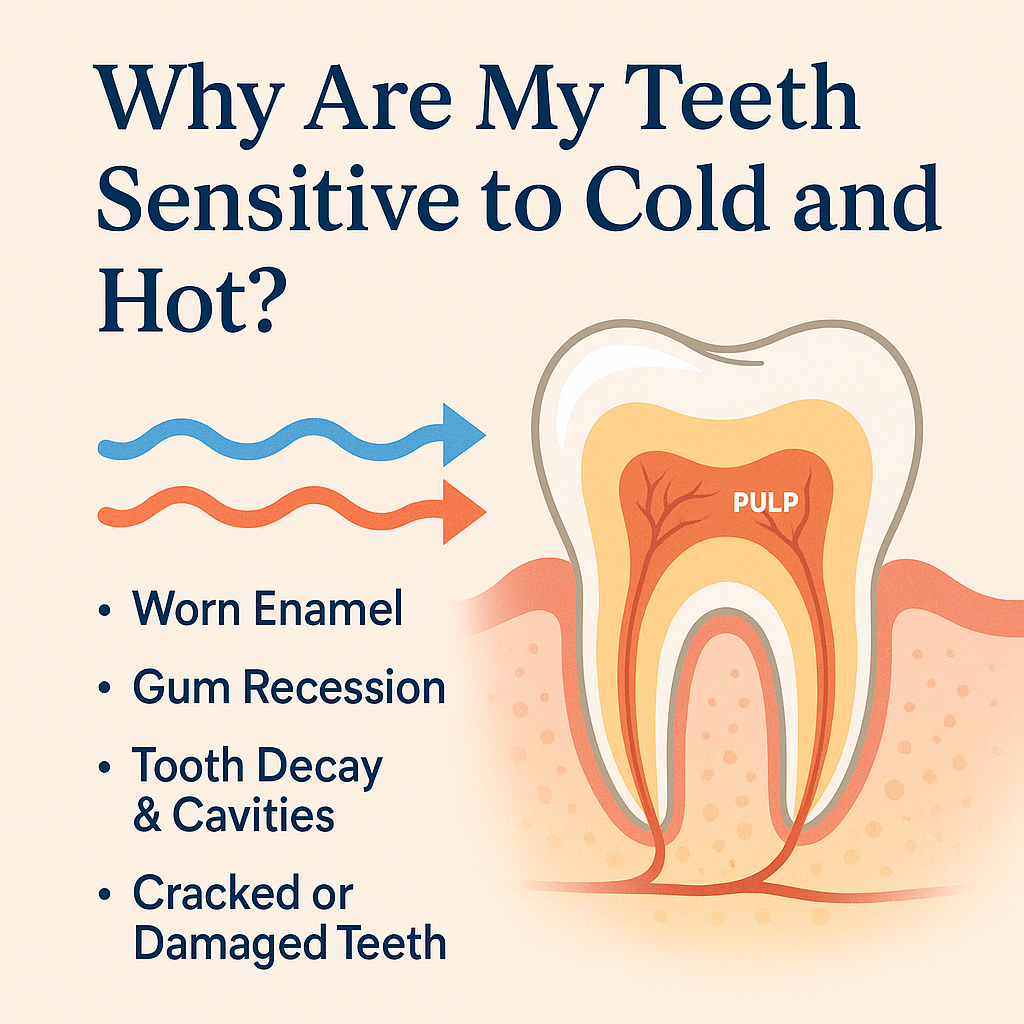TL:DR: Tooth sensitivity to hot and cold usually happens when enamel wears down or gums recede, exposing the dentin and nerves underneath, but with proper care and dental treatment it can often be relieved or prevented.
Have you ever taken a sip of ice water, only to feel a sudden, sharp jolt in your teeth? Or maybe you’ve enjoyed a spoonful of hot soup and felt a lingering ache afterward. This uncomfortable reaction is known as tooth sensitivity — and it’s one of the most common dental concerns patients bring up at Designing Smiles.

The good news? Tooth sensitivity isn’t something you have to live with forever. By understanding what causes it and how it can be treated, you can take control of your oral health and enjoy your favorite foods and drinks without discomfort.
In this guide, we’ll walk you through why teeth become sensitive to cold and hot, what it means for your dental health, and what you can do about it.
Your teeth may look solid, but they’re actually made of several layers:
– Enamel – The hard, protective outer layer that shields the tooth. (Learn more from the NIDCR here)
– Dentin – A softer layer beneath the enamel that contains tiny tubules leading to the tooth’s nerve.
– Pulp – The innermost layer where the nerves and blood supply are housed.
When enamel is strong and intact, it protects the dentin and pulp from outside sensations. But when enamel thins or the gums recede, the dentin becomes exposed. Suddenly, those temperature changes from hot coffee or cold ice cream can travel through the dentin’s tubules directly to the nerve — causing that sharp, zinging pain you feel.
Tooth sensitivity can happen for many reasons. Here are the most common culprits:
– Over time, enamel can wear down from brushing too aggressively, eating acidic foods (like citrus or soda), or grinding teeth at night.
– When enamel thins, the dentin underneath becomes vulnerable, making temperature changes more noticeable.
– Gums naturally recede with age or due to gum disease.
– As gums pull back, they expose the tooth’s root surface — which has no protective enamel.
– This root exposure often leads to significant sensitivity.
– Even small cavities can cause sharp pain when exposed to hot or cold.
– As decay spreads deeper, sensitivity becomes more intense and may progress to a dull, throbbing ache.
– A crack in a tooth creates a direct pathway for temperature and bacteria to reach the inner layers.
– Cracks may be invisible to the eye, but sensitivity is often the first warning sign.
– Fillings, crowns, or teeth whitening can sometimes cause temporary sensitivity.
– This usually resolves within a few days to weeks.
– If it doesn’t, it’s important to have it evaluated.
– Habitual grinding or clenching wears away enamel and stresses the teeth.
– Over time, this exposes dentin and leads to sensitivity.
– Aggressive whitening treatments
– Diet high in acids and sugars
– Exposed dentin tubules due to erosion
– Advanced gum disease
Occasional sensitivity may not always signal a major dental problem. But persistent or worsening sensitivity should never be ignored.
Red flags include:
– Sensitivity that lingers long after exposure to hot or cold.
– Pain that comes on suddenly and doesn’t go away.
– Swelling, bleeding gums, or visible cracks in teeth.
– Pain concentrated in one area, rather than all over.
These could indicate cavities, infection, or even the need for root canal therapy. Early treatment not only relieves pain but also prevents more serious dental issues.
If your sensitivity is mild or occasional, there are several steps you can take at home to protect your teeth:
– Switch to sensitivity toothpaste: Look for ingredients like potassium nitrate or stannous fluoride. These help block pain signals from traveling to the nerve.
– Use a soft-bristled toothbrush: Gentle brushing protects enamel and gums from wear.
– Avoid acidic foods and drinks: Soda, citrus, wine, and sports drinks can erode enamel.
– Practice good oral hygiene: Brushing twice a day and flossing daily keeps decay and gum issues at bay.
– Wear a night guard: If you grind or clench, a custom-fitted guard protects your teeth.
– Rinse with fluoride mouthwash: Strengthens enamel and reduces sensitivity.
When at-home care isn’t enough, your dentist at Designing Smiles can provide targeted treatments:
– Fluoride Varnish or Gel: Strengthens enamel and helps seal exposed dentin.
– Bonding Agents: A resin material can cover exposed areas and protect nerves.
– Gum Grafting: Restores gum tissue where recession has exposed roots.
– Fillings or Crowns: Repair cavities or cracked teeth that are causing sensitivity.
– Root Canal Therapy: For severe, persistent sensitivity caused by infected pulp.
– Custom Night Guards: Protects against bruxism-related enamel wear.
Your dentist will determine the best option based on the cause of your sensitivity.
Is tooth sensitivity permanent?
Not necessarily. Many cases can be treated and even reversed with proper care.
Why are only some of my teeth sensitive?
Decay, cracks, or gum issues often affect certain teeth more than others.
Can whitening cause sensitivity?
Yes. Whitening products can temporarily open dentin tubules. This sensitivity usually fades after treatment.
Does sensitivity toothpaste really work?
Yes, but it may take several weeks of consistent use to notice improvement.
Do I need to avoid cold and hot foods forever?
No. With the right treatment, you can enjoy a normal diet again.
– Myth: Tooth sensitivity is just something you have to live with as you age.
– Fact: Sensitivity is not “normal.” It usually signals an underlying issue that can be treated.
– Myth: If sensitivity toothpaste doesn’t work in a few days, it won’t work at all.
– Fact: It can take several weeks for desensitizing toothpaste to take effect.
– Myth: Sensitive teeth always mean cavities.
– Fact: While decay is one cause, gum recession, enamel wear, and grinding are equally common culprits.
Tooth sensitivity is common, but it’s not something you should ignore. Whether your discomfort is mild or severe, the underlying cause needs to be identified — and treated.
At Designing Smiles, we help patients in Roseville and across the Twin Cities find relief from sensitive teeth every day. From preventive care to advanced treatments, our team is here to help you smile with confidence and comfort again.
👉 Schedule your exam today at SmilesMN.com and take the first step toward lasting relief from tooth sensitivity.
Want more? Here's a good thread on Reddit
